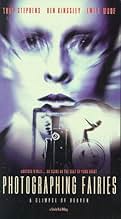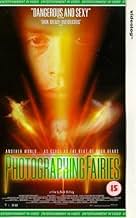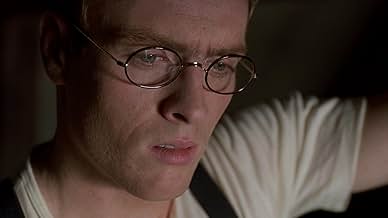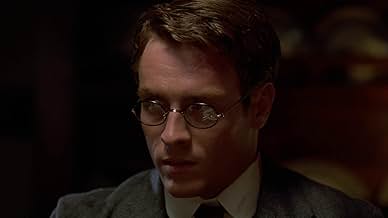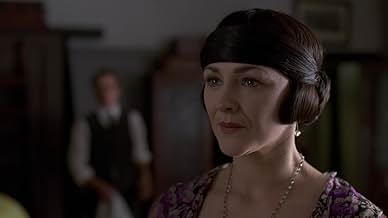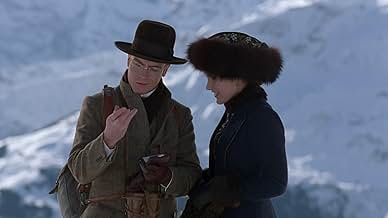El fotógrafo Charles Castle está aturdido por el dolor tras la muerte de su novia. Se va a la guerra y trabaja en las trincheras como fotógrafo. Tras la guerra y aún apesadumbrado, Charles r... Leer todoEl fotógrafo Charles Castle está aturdido por el dolor tras la muerte de su novia. Se va a la guerra y trabaja en las trincheras como fotógrafo. Tras la guerra y aún apesadumbrado, Charles recibe unas fotografías que dicen ser de hadas.El fotógrafo Charles Castle está aturdido por el dolor tras la muerte de su novia. Se va a la guerra y trabaja en las trincheras como fotógrafo. Tras la guerra y aún apesadumbrado, Charles recibe unas fotografías que dicen ser de hadas.
- Dirección
- Guión
- Reparto principal
- Premios
- 5 premios y 3 nominaciones en total
Reseñas destacadas
pleasure of catching this little gem. I kept seeing it in parts and
even in the little snippets, it drew me in and had such a haunting
quality. It was on the other night and I just sat and watched it all the
way through and despite the fact that I'd seen some scenes
before, it still held such a wonderful presence. It's hard to really
describe the movie -- part love story, part fantasy, with a little bit of
the Big Question over exactly what the afterlife is. The
cinematography is absolutely picturesque, almost like watching a
Merchant Ivory production, but with a bit of fairy magic thrown in.
Ben Kingsley is an interesting addition to the cast. I wish there
was more characterization done on all the main roles. You get a
sense of where everyone comes from in terms of motivation, but
more background would have made for a richer film. The pace is
sometimes inconsistent, moving quickly in the beginning, then
slowing, then speeding up again. But the film's dry English wit
makes for enjoyable moments of irreverence. It's still just an
overall beautiful film. Very bittersweet and heartbreaking in
moments. The end is shot with such care and emotion. As
fantastic as the premise is, the heart of the movie is something
everyone can understand -- the loss of a loved one and the chance
to rekindle a spirit burdened with sorrow. A funny bit of irony -- the
actor who played Watson in the BBC Sherlock Holmes series is in
this movie and he plays (har har har) Sir Arthur Conan Doyle.
A positive surprise. The film is about a British photographer who's specialized in trick photography after he came home from WW1. He's a rational man, to the point where he's almost dead inside (the very opposite of Arthur Conan Doyle who also shows up in the tale, played by the guy who played Watson in the TV show btw) but that changes when a woman brings him some photos she claims show her daughters playing in their garden with a bunch of... you guessed it, fairies.
This is essentially a fantasy film, but it's not quite like most other fantasy films; questions about belief is the central theme, but it's stretched and played around with so it's constantly intriguing, even for a cynical agnostic (atheist if you're Christian) like me. Is heaven a state of mind, and if so, does that make it less worth? How do you find truth in life, and is it ever better to lie about the truth for the sake of those you love? Thematically they've incorporated many of the more "out there" ideas from the book in rather clever ways; drugs, sex, violence, are also themes in Szilagyi's innocently looking book, and the filmmakers have tried to stay true to this. This isn't some film about small creatures with crowns on their heads who smiles a lot, nor is it a funny Spielbergian flick, it's an exploration of grief and obsession and how those things can affect our beliefs, shake us to the very core. Yeah, it doesn't sound very jolly, which I guess it isn't, but it's interesting.
The cast is excellent, the music and photography far better then I had expected (same goes for the limited fx). Going by the cover and BBC's name on it somewhere, I actually thought it was maybe a TV movie. Really brilliant use of slow motion, not just for kicks, as a gimmick, even though it looks ravishing as well, but actually done in a meaningful way with regards to the plot (though that's easier to see if you've read the book).
The writers have changed a lot with regards to the plot; shuffled around, condensed, introduced new scenes/characters, and so on, but that's like it should be. Any attempt to take the book directly from the page would've failed miserably. They've even introduced a completely new intro & ending as well. It works like a charm, though some might find it a bit too convenient.
I did have some problems with it though... the lead is deliberately almost always kept at arms length, which is okay in some ways, but leads to detachment. I ended up finding his destiny more stimulating and interesting then gripping. There is also the inherent problem a book like this one poses when turned into a movie; how do you visualize ideas and thoughts. How do you visualize symbols? Film is a literal medium, and so it can't hide things the way language can, this film proofs that by coming up short in some of the books most magnificent sequences (but it improves on others); this isn't a fault from the filmmakers, what can they do after all, but it is a problem when they've chosen a story that is essentially more about mystical/spiritual question (going all new age here) then it is about the literal discovery of fairies.
Anyway, despite my few complaints, and despite the fact that this is not a mind blowing, life altering, hyper super fantastic religious experience of a film, I still highly recommend it. It's a rather unique and different attempt to play in the fantasy pen, and that is to be applauded I think. It's also pretty entertaining... if your idea of a good time is a bunch of Brits running around in gardens searching for fairies that is.
Toby Stephens plays Charles Castle (Stephens to me has some strikingly similar traits to Hugh Grant), who tragically lost his wife on the Swiss Alps. The movie chronicles his struggles to come to grips with her death and how the possibility of an afterlife (I don't wish to give the story away)makes him obsessed to prove that there is such an afterlife.
I was impressed by Stephens in this movie and am sure that bigger things will come his way. I was also impressed with Emily Woof who plays the romantic (if that can be said) support to Stephens. Woof was very good in the Woodlanders and continues her fine form here.
Ben Kingsley is also commanding in the movie and his counternance to Stephens desire to prove the existence of the fairies is the keystone of the movie's conclusion.
I tend to like movies that have story lines that I have not come across before. This is one such movie. The pleasing aspect is that the acting supports the plot which leads to a pleasant viewing experience.
This movie gets my thumbs up 7/10
The central concern of the film, that of seeing, or not seeing (or perhaps more perhaps *comprehending*, or not - is established in the opening shot of the film: the blurred face of Castle alone in the group photograph he takes of his wife and others. In an image which anticipates those of the fairies later on, he is the one blurred, here the 'ghost' on his film. Appropriately, in a film full of echoes and symbols, this long shot out from Castle's wife's iris recalls his later, obsessive, photographic enlargement of another eye: that of one of the girls photographed with fairies.
The death of his wife then reduces Castle further, through grief and shock, to a state almost like that of a somnambulist. He walks through life, hovering between the shades, oblivious to fear and the concerns of the real world - as evidenced by the unexploded bomb he encounters without any sense of danger, ticking like the time piece he keeps to remember his wife. Castle doesn't care. He wants to die - a sense of foreboding which stays with the viewer from the beginning to the end of the film. He even 'photographs the dead' in his studio, witnessed by his work for the soldier's parents. Even when a new sexual relationship becomes a possibility, later in the film, he cannot rejoin this aspect of life though spiritual malaise.
This thread is continued later in the scene later where Castle enters the church to hear a sermon by the bereaved Kingsley. Earlier that morning he has taken the flower-drug and has 'died' watching the fairies. Now he appears, bloodied like a victim in Macbeth, as the pale ghost at the ceremony..
Castle's attempt to photograph fairies, spirits who hover between life and death, is obviously an attempt to capture something back from the spirit world that has captured his wife. Such is the delicacy and subtlety of the films structure and symbolism, however, that at the end one could feasibly argue that Castle actually died with his wife on the mountain and - rather like in The Occurrence At Owl Bridge Creek - what has happened since the opening scenes has just been the dream of a dying man!
Performances are generally excellent (although Ben Kingsley's wig and stare are slightly disconcerting). Those who found the actual fairies disappointing in effect were perhaps expecting something grander. Some of Castle's hallucinations reminded me of Jacob's Ladder and Kingsley's demise of the killer's suicide in Peeping Tom.
As a last instance of the film's care with presentation and sophistication, one may take the music. The chief elements that reoccur are a sombre dirge like bass-motif and a light waltz. Only at the end of the film does recognise that the bass-motif is an altered element of the famous Beethoven slow movement which plays throughout the last few scenes. Like Castle himself, it is transfigured - or 'completed' by events.
¿Sabías que...?
- CuriosidadesEdward Hardwicke (Sir Arthur Conan Doyle) has played Doyle's Dr. Watson many times.
- PifiasWhen discussing the original photograph with Beatrice Templeton (Frances Barber), Charles Castle (Toby Stephens) says that the supposed fairy in the image could just be a 'glitch in the emulsion'. The use of the word 'glitch' is anachronistic. Glitch, meaning a small fault, didn't come in to common parlance till the 1960s some 40+ years after the setting of this film.
- Citas
Gardner: Everyone of you here, ladies and gentlemen, has something in common, something that links you to your neighbor. We are all of us searching for a clue that shows us what life truly promises us, for a way of seeing what lies under the simple surface of things. Now recently, we've had continued messages at seances, messages indicating that a visible sign was coming through. Ladies and gentlemen, that sign is here. People talk about the miracle of photography. I'm going to show you a photograph of a miracle.
- ConexionesVersion of BBC2 Play of the Week: Fairies (1978)
- Banda sonoraSymphony No. 7 Op. 92 II. Allegretto
Written by Ludwig van Beethoven
Performed by The Philharmonia Orchestra
Conducted and orchestrated by Terry Davies
Selecciones populares
- How long is Photographing Fairies?Con tecnología de Alexa
Detalles
- Fecha de lanzamiento
- País de origen
- Idioma
- Títulos en diferentes países
- Fotografiant fades
- Localizaciones del rodaje
- Empresas productoras
- Ver más compañías en los créditos en IMDbPro
- Duración1 hora 46 minutos
- Color
- Mezcla de sonido
- Relación de aspecto
- 1.85 : 1
Contribuir a esta página


